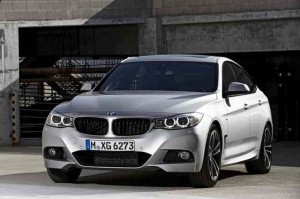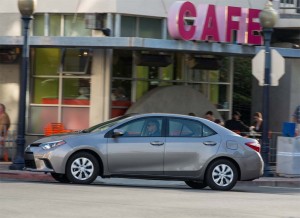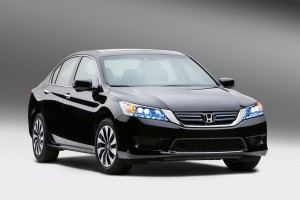
Jurors picked two diesels, inclluding the new BMW 328d, the maker's first 4-cylinder "oil-burner" to reach U.S. showrooms.
Green cars are going mainstream. American motorists no longer have to look for stone-pony-slow econoboxes or premium-priced specialty vehicles to drive something clean and fuel-efficient, and that has made for an interesting round of choices as the sponsors of the Green Car of the Year reveal their five finalists.
Significantly, while there’s been much media attention on electrification in recent years, the list includes only one battery-based model, the 2014 Honda Accord Hybrid, with not a single additional plug-in or pure battery-electric vehicle making the cut. By comparison, there are two new diesels and a pair of models using new technologies to boost the fuel efficiency of conventional gas vehicles.
The finalists for the 2014 Green Car of the Year, in short, underscore the general perception within the industry itself that there is no single, silver bullet when it comes to reducing emissions and improving fuel economy.
“The diversity of this field of finalists illustrates not only that ‘green’ has gone mainstream, but also that there is no single approach to achieving ever higher levels of fuel efficiency and environmental performance,” says Ron Cogan, editor and publisher of Green Car Journal and CarsOfChange.com, which sponsor the annual award.
The five finalists for 2014 include:
-
The Audi A6 TDI which, jurors suggest, “blends excellent ‘green’ credentials with unexpected levels of performance.” The 3.0-liter diesel delivers as much as 38 mpg on the highway;
- The BMW 328d, which features the first 4-cylinder diesel BMW has offered in the U.S. market. Adding such features as Stop/Start and brake regeneration boosts fuel economy to 45 mpg;
- The Honda Accord is the only hybrid to make this year’s list. It adopts the Japanese maker’s new 2-motor system which delivers surprising performance – and a 50 mpg city rating;
- The Mazda3, now in its third generation, adopts the maker’s new SkyActiv technology which includes lightweighting as well as a new, high-compression engine yielding near-hybrid mpg;
- The Toyota Corolla rounds out the list, a surprise only in that Toyota usually makes the list with one of its hybrids. The Corolla was cited for its new gas engine Eco mode technologies.

Typically associated with hybrids, Toyota landed among the finalists for its new Corolla's gas-engine tech.
The Green Car of the Year award has had a history of defying conventional wisdom, especially when it comes to battery power, honoring alternatives such as the Audi A3 diesel – a move many advocates suggest helped gain more credibility for diesels which are just beginning to make a comeback after decades of being snubbed by American motorists.
Organizers stress that finalists for the Green Car of the Year award must first and foremost “raise the bar in environmental performance,” using technology with the potential to “make a real difference.” That tends to rule out vehicles that may use breakthrough systems with little real-world application.
Jurors include such luminaries as oceanographer and environmentalist Jean-Michel Cousteau and car fanatic and Tonight Show host Jay Leno.
The winner will be announced during the L.A. Auto Show next month.


It’s just laughable in a SAD context that the U.S. is just discovering “clean” Diesels that the rest of the world has been using for decades.
If Obama and the EPA had their way there would be no Diesels allowed in the U.S.A. at all and everyone would be forced to buy a hybrid or EV.
US drivers would find it amazing there are virtually no hybrids in my Italian “hometown” – but 80% of all cars are clean “tech” diesels. Even models like the Ford Escape [Kuga], Dodge Journey [Fiat Freemont], Chrysler minvan, etc. You’ll rarely see any BMW, VW, Chevy Cruze that’s not diesel. Over there, I’ve got a ’92 Citroën AX, over here a 2011 VW Jetta TDI. They get the same mileage, but the VW has more than triple the horsepower, four times the torque, weighs exactly twice as much, and is roomier both front and rear. The Citroën has a 1.1L fuel injected gas engine, the VW a 2.0L turbodiesel.